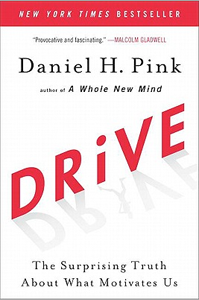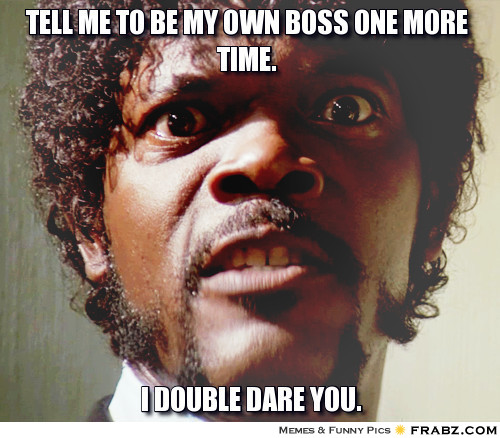One of the important aspects of writing these sorts of articles is to keep reading new materials and resist the temptation to rest on one’s laurels and (probably poorly remembered) old readings. To that end (and my own personal obsession with motivation), I picked up “Drive, the surprising truth about what motivates us” by Dan Pink (audiobooks totally count. Shut up). In it, Pink discusses the scientific research that demonstrates the ineffectiveness of motivational practices in place at most businesses and attempts to identify methodologies for actually getting desired results. He articulates several “Operating Systems” for motivation over the years and the evolution of them into the 21st century. He breaks down motivational concepts into the antiquated “tried and true” carrot and stick method, and works his way into more sophisticated driving factors that transcend the simplistic reward/punishment threat dichotomy.

Carrot and Stick? More like “insightful deep dive into the philosophical underpinnings of human motivation wrapped in simplistic terminology and accessible metaphors” … wait.
As I listened to this book, I was considering the implications professionally, personally and philosophically (which made driving an interesting and probably dangerous proposition). Obviously, the professional implications are clear: Bow to the decades of behavioral research and implement policies that actually fulfill performance goals. Concepts like “Results Only Workplace Environments” that allow employees to not only set their own schedule, but also rejects the entire notion of tracking time. Everyone simply performs their duties where and when they please. Another notion of “FedEx days” are where you take 24 hours (Usually Thursday-Friday) and have to start and finish a passion project. So called as one has to “Deliver something overnight”. These notions are fine and dandy (and definitely something I’m keeping in mind for my career), but there’s not much I can do, personally, with that.
Personally relatable concepts included things like identifying whether one is motivated by extrinsic factors (Money, obligations, achievements, etc.) or intrinsic factors (personal growth, being part of a larger purpose, etc.). Looking at these sorts of things can be insightful in one’s own life and finding ways to motivate and achieve goals. Pink includes interesting conclusions about the nature of goals and their focusing effect. If one is working on “algorithmic” or formulaic and straightforward tasks, one can certainly benefit from the offer of rewards and goals. However, if one is working on “heuristic” or creative/solution-oriented task, it can actually negatively affect performance. This makes no real sense, but there’s some serious studies that back it up.

The lesson is “Never Try”. Wait, no, I mean “Always Try”. Wait, I mean “Do or Do Not”. Y’know what, let me get back to you later.
Most interesting to me, as a selfless blog-guy, is the philosophical implications of some of these findings. Folks in these studies were often more motivated by a sense of purpose than by money. In real world examples that he covers, people discuss how salaries are a negative, but not a positive. I.E. not enough money is a problem, but once you get “enough”, more won’t actually help. This starts to show that people are not so simple as Positive Reinforcement/Negative Reinforcement. Humanity has a deep seated urge to strive for better and greater things. While we’ve touched on this before, It’s interesting to see actual studies and writings back it up directly. This need for purpose and a place in the greater scheme is something that appears to manifest anywhere that people’s basic requirements are met. Once we’re no longer concerned with our next meal or where we’re going to sleep, we start to look for a surprising amount of substance from our lives.
Within our specified nerdy microcosm, this is insightful. We have our trading card games where the goal may not be to win every match ever so much as seeing how far we can go with a ludicrous deck or testing a game mechanic to see if you can break/manipulate it. When consuming our various media, we don’t simply want to rehash the exact same stimuli that we’ve consumed time and again. We desire those variations to provide context and substance to our experiences. Within video games, specifically, we have all encountered games where the challenges have ranged from the “Goldilocks” tasks that balance meaning, difficulty and ability to actually accomplish it; all the way to the horrific drudgery of pointless fetch-and-get or escort missions.
So at the end of the day, we aren’t quite the simple, mindless drones that economists would like to think. Our actions are predictable, sure, but they’re a little bit more nuanced than merely robotically working through a series of instructions and algorithms.
Unless you work in retail or fast food, in which case you would appear to not be human and may God have mercy on your soul, which you may or may not have, depending on whether you believe in silicon-heaven.


